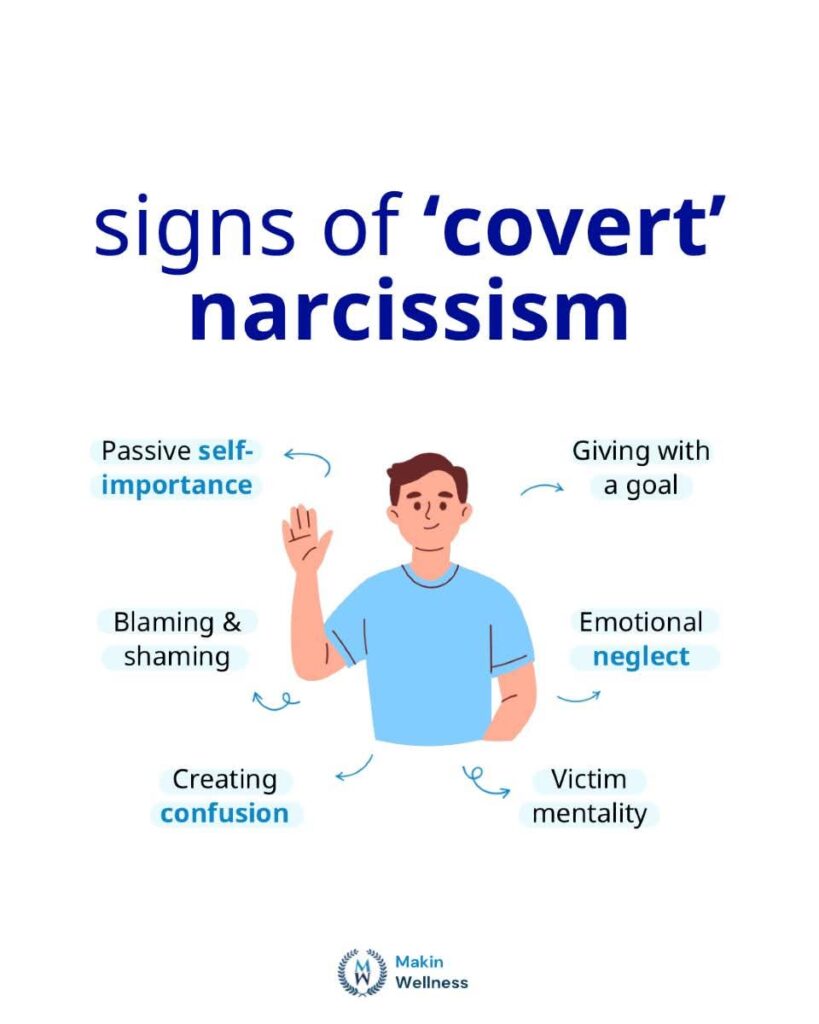Narcissism. It seems like the word is everywhere: politics, Hollywood, the music industry, and big (and small) business. While you can define narcissism by the baseline behaviors of narcissistic personality disorder (NPD), there are different types of narcissism based on specific behaviors. Covert narcissism is our topic for today.
As mentioned above, some characteristics are common to all narcissists. These include:
- believing that you are special and unique,
- fantasizing about power and success,
- needing excessive attention,
- feeling entitled,
- exploiting others, and
- lacking empathy.
You may be most familiar with overt (grandiose) narcissism, in which the person is very extroverted, likes to show off, lies frequently, “does no wrong”, and has shallow relationships. You may be less knowledgeable about the behaviors of a covert (vulnerable) narcissist, which we will discuss below.
We will be looking at covert narcissism from two perspectives. One will be from the viewpoint of what your behaviors and emotions might look like if you are a covert narcissist. Then we will look at actions someone who knows a covert narcissist might see and experience.

What is covert narcissism?
When you think about the word covert, ideas of spy-like or sneaky behavior often come to mind. That’s not quite what we mean here. Instead, covert in ‘covert narcissism’ refers to more introverted behaviors. Because of the nature of these behaviors, a covert narcissist can be more challenging to recognize.
So what are some signs of a covert narcissist?
- Tell me I’m great – You tend to get attention by making comments that emphasize what you’re not good at. Your attention seeking is explicitly done to get others to encourage you and try to talk you out of believing unhealthy thoughts about yourself.
- Playing the blame game – You believe that nothing is your fault, everyone else is to blame, and you make sure they know it.
- Are you confused yet? – You thrive in creating chaos for others. The more confused your target is, the more power you have to manipulate them.
- Why should I? – You do not care about doing something unless you see how it will negatively affect you. If not doing something negatively affects someone else, that’s their problem.
- What’s in it for me? – You are willing to give of your time and money, as long as there is a way for you to get something out of it. Praise and attention for you are common end goals.
- Baby, I’m the greatest – You can give your all for a cause or event, then get burnt out and abandon the project. Because your goal is attention, you may not have any real connection to the cause.
- Work for my attention – Once you have roped someone in emotionally, be it a significant other or one of your children, you will systematically begin neglecting them. This can be cyclical: You neglect them, they show you more attention, you return their attention, and then you begin neglecting them again.
- Why would you say that to me? – You are free and open with criticism for others, but if someone criticizes you, you become defensive, angry, and likely verbally attack the other person. It doesn’t matter if they critiqued you gently or harshly.
- What if others find out? – Your lack of empathy can make it hard to fit in with others. You may prefer engaging with people through social media, where you can control how people see you. Additionally, you likely form shallow relationships because you don’t allow people who are not close to you to get to know you.
- I’m lower than dirt – You often speak about yourself negatively, e.g., “I’m stupid”, “I can’t do anything right,” or “You would be better off without me.” This behavior allows you to get attention from people as they try to make you feel better.
- Feeling some emotions – You are likely prone to depression and anxiety based on your past experiences and thought processes. Depression can be due to a pessimistic view of life, self-fulfilling prophecies, and not working through your trauma. Anxiety could manifest because of trying to present a good image, keeping track of which lies you told others, and, as with depression, having suffered past trauma.

What are some examples of covert narcissistic behavior?
We all have bad days and go through difficult times; those external stimuli can affect how we treat others; covert narcissism is more deeply ingrained. With a covert narcissist, you will see the following behaviors consistently, whether their life seems to be going well or poorly.
- Public versus private image – You act charming and lovable in public, but you are mean and nasty in private.
- Belittling for mistakes – You make a big deal of any size mistake someone makes. You habitually remind others of their mistakes and how stupid they are for making them.
- Rage and then denying the anger – You can go into a full meltdown and throw a temper tantrum, then later deny the behavior and act like you only got a little upset.
- Guilt trips – You manipulate the emotions of others to get them to do what you want, using “poor me” sentiments to get your way.
- Gaslighting – You do something bad or mean to someone, then work to convince them that it actually didn’t happen.
- Passive aggression – You don’t address problems directly; instead, you use verbal and nonverbal cues to express your anger or frustration.
What causes covert narcissism?
While there are no definitive answers to what exactly causes someone to become a covert narcissist, there are some plausible factors. It can be hard to have empathy for a covert narcissist, so some of the reasons outlined below may help you better understand why they behave the way they do.
1. Genetics
There is a link to narcissism being hereditary, as many narcissists have a narcissistic parent. To this end, there is research that has concluded that being a covert narcissist likely has more genetic causes than environmental.
Additionally, research shows that there may be a connection between elevated amounts of oxidative stress and narcissistic personality disorder. The extra oxidative stress creates an imbalance that causes your body to absorb more oxidative chemicals than it should.
2. Childhood abuse and trauma
As with many narcissists, abuse and trauma when growing up can increase the chances of you developing narcissistic personality disorder. These events can cause you to detach from your emotions as a self-defense mechanism to keep you from getting hurt more.
3. How you were raised
Having an emotionally unattached parent, one that pushes you to be perfect at everything, or one that views you as perfect and lets you run wild, can also increase the rise of narcissistic traits in children.
Do they know what they are doing?
The answer is: maybe, maybe not. If you are a covert narcissist, you may, to some degree, know that your behavior is hurtful.
Yet, since covert narcissists often lack self-awareness, you likely do not fully understand the massive impact of your actions. Typically, for a narcissist, the ends justify the means, and you will do what you need to do to get what you believe you deserve.

What can you do to get help?
There are different tools for seeking help, depending on whether you are the covert narcissist or you have any type of relationship with a covert narcissist. We will discuss help for both.
What if you are the covert narcissist?
1. Medication
For personality disorders like narcissistic personality disorder, there are no medications to “fix what’s wrong”. Nonetheless, with covert narcissism, medication can help with depression and anxiety.
Addressing those mood disorders may help stabilize your mood and regulate your hormones. This can allow you to have a more level starting point and help you see situations and your behavior differently.
2. Online therapy
Online therapy can be an excellent option if you prefer to be more in control of your situation, since it is more flexible regarding where and when you meet.
Talking about your responses to the actions of others with a neutral online therapist can provide a healthy perspective. This can benefit your interpersonal relationships and help you learn ways to regulate your emotions. Also, working through your childhood trauma and learning better coping skills can help improve your day-to-day life.
Building a trusting relationship with an online therapist may be challenging, but being honest and open to making even small changes could be good for you. Cognitive behavioral therapy (CBT) has been shown to help when you are struggling with covert narcissism.
There is hope, and having the right support can be important. Since, as a covert narcissist, you have usually experienced some childhood trauma or abuse, facing those issues can sometimes be difficult while sitting in a room with a therapist.
Online therapy gives you the safety to talk about what you experienced “in person”, but still at a distance. If it gets too overwhelming, you can always end the phone or video call. It may also allow you to begin to reduce your use of defense mechanisms while in an online therapy session.
What if you have a relationship with a covert narcissist?
1. Don’t take it personally
Whether you work with a covert narcissist, know one socially, or are in a relationship with one, please know that how they treat you is not personal. It comes from a place of hurt and lack in them. That being said, it does not excuse their behavior.
2. Set boundaries
As part of not excusing their behavior, you will have to set firm boundaries. Your doing so, will, in all probability, anger the covert narcissist. Please refer to the previous point. If you do not set appropriate boundaries, they will continue to treat you poorly.
3. Advocate for yourself
Setting boundaries can help you advocate for yourself. Included with this is being able to speak up and express your opinion. You have just as much right to do this as the covert narcissist thinks they have the right to treat you like they do. Sitting down and reviewing your rights, thoughts, views, beliefs, and values can be helpful.
4. Create a healthy distance
Depending on your relationship with the covert narcissist, “healthy distance” can vary greatly. It can be as small as not spending time with them one-on-one (always including someone else), all the way up to going “no contact”, where they don’t have a way to get in touch with you.
5. Online therapy
Because a covert narcissist is a master manipulator, it may be challenging to determine what is normal and what is abusive in your relationship at first. It can be beneficial to have someone to discuss it with, like an online therapist.
Trying online therapy also allows you to have a safe place to talk without the chance of running into the narcissist, because you choose where you are for the session.
Why not take the first step today with Makin Wellness?
Knowing that there is a safe space in which to address your struggles with covert narcissism could make it easier to start your journey to freedom. Makin Wellness offers trusted online therapy in which you can let your guard down and begin rebuilding your self-image.
Online therapy provides a neutral, exclusive space to:
- Learn about covert narcissism;
- Practice evidence-based techniques, like CBT, with professional guidance;
- Build practical coping tools; and
- Set goals that reflect your values.
You deserve to be empowered to make good choices. Your Makin Wellness online therapist is here to help when you’re ready.
If you are unsure whether this kind of treatment is right for you, don’t worry, your therapist can help answer any questions you have about working through difficulties with covert narcissism. Call us at (833)-274-heal or click here to schedule an appointment with one of our caring online therapists today.
Further Reading:
- How To Destroy Preferred Weapons Of People With Narcissism
- Is It Love Or A Lovebomb? How To Tell The Difference Between Manipulative Abuse And Real Love
- What Is Gaslighting? Signs, Examples, And 6 Ways To Break Free
- How To Build Resilience: 7 Transformative Steps To Strengthen Your Mind And Handle Life’s Challenges







